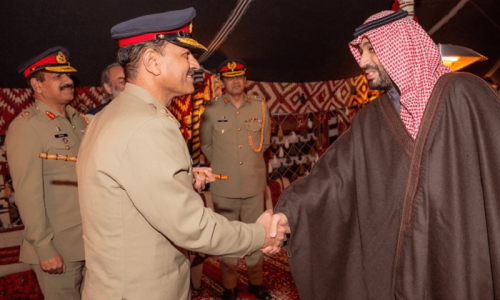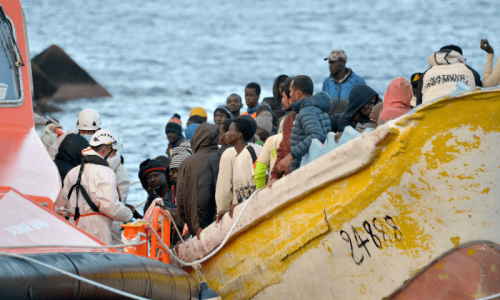WASHINGTON: Videos and eyewitness accounts published in The Washington Post on Tuesday, show how Jewish settlers attacked the Palestinian village of Qusra, in Israeli-occupied West Bank, killing three people and forcing others to leave the village as Israeli soldiers watched silently.
The victims included 17-year-old Obada Saed Abu Srour, civil engineer Muath Raed Odeh, and 20-year-old Musab Abdel Halim Abu Rida.
These individuals lost their lives while attempting to protect their community from armed Israeli settlers who had been targeting Palestinian villages even before the Oct 7 Hamas raid.
In one of the videos, the attackers, masked and armed, can be seen targeting the home of blacksmith Awad Mahmoud Odeh, located close to the Esh Kodesh Israeli settlement.
Attackers, masked and armed, can be seen targeting the home of blacksmith Awad Mahmoud Odeh
Abu Srour was shot in the back, while attempting to escape the gunfire. Despite the obligation under international and Israeli law to protect all residents, including Palestinians, Israeli troops did not intervene forcefully.
The attackers, carrying pistols and an M16 rifle, clashed with residents, causing injuries and fatalities. Witnesses claim that Israeli soldiers, stationed at nearby military outposts, did not intervene, raising concerns about their adherence to military orders requiring the prevention of crimes.
The aftermath of the attack saw more than 800 Palestinians displaced from their West Bank homes in the following month, contributing to the escalation of violence between Israelis and Palestinians. The incident is currently under review by the Israel Defence Forces (IDF), and police have initiated an active investigation.
The failure of Israeli authorities to respond effectively to the violence on Oct 11 has sparked criticism, with human rights lawyers pointing out a pattern of inaction in the face of settler attacks.
The evidence collected by The Washington Post raises questions about Israel’s commitment to protecting Palestinian residents in the West Bank, as the report pointed out.
Witnesses reported that the attackers intentionally collided with a car in the area and began shooting at it.
The assailants then proceeded to fire at several residents, prompting at least 12 Palestinians to flee north, seeking cover behind a large building away from the gunfire.
Local residents told investigators Israeli soldiers, stationed at two military outposts situated between the settlement and the village, did not intervene at all as the violence unfolded.
Visual evidence suggests that soldiers had clear views of the road where residents were fleeing and the building they sought refuge behind.
Despite the proximity of military forces to the attackers and the village, the invasion continued uninterrupted.
Eyewitnesses told journalists that the Israeli border police even cautioned residents not to attempt to stop the armed settlers. Only the police were allegedly authorised to confront the attackers, and since they did not, the villagers remained exposed to the violence with no protection from any side.
The incident reportedly unfolded over several hours, with the attackers leaving the village around 1.30pm after firing at residents.
The violence resumed later in the day when the settlers gathered outside Awad Odeh’s home, about half a mile from the initial attack. Israeli forces intervened only after violence subsided, ensuring that the attackers face no retaliation.
Prior knowledge
The report notes that the soldiers’ attitude “raises questions” about Israel’s willingness to protect Palestinians. “There’s evidence suggesting that the military had prior knowledge of the violence, yet failed to take timely action to prevent the tragic consequences,” the report added.
The incident is under review by the Israeli military and police, as human rights activists and UN officials demand accountability for the incident and the protection of Palestinian communities in the West Bank.
These quotes from the Washington Post report illustrate the attack was planned, how it unfolded, and how the Israeli soldiers allowed it to happen.
“To all the rats in the sewers of Qusra village, we are waiting for you and we will have no mercy. The day of revenge is coming,” threats sent via Facebook to residents of Qusra on Oct 9.
“He said he wanted to go and help. I told him there was no need… He said, ‘If I die, I die — I would be martyred.’”
Aya, mother of 17-year-old victim Obada Saed Abu Srour, recalls her conversation with her son on the fateful day.
“I saw on the [security] cameras there were settlers around our home destroying cars and shooting at windows,” said Awad Mahmoud Odeh, describing the attack on his home during the incident.
“As soon as we got 10 to 15 meters out of our home, they shot at my family and injured my daughter, and I got shot right after,” said Odeh, recounting his experience during the attack.
“It was like being in an action movie. I didn’t expect to come out alive.”
Explaining how they survived the attack, Odeh said: “We hid in the house, and they tried to get in, and they shot and swore at anyone they saw.”
Describing the moment when armed settlers attempted to break into his home, Odeh said: “I’ve never been in a position like this.
“There’s no doubt that [the Israeli army] should have stopped it. They should have detained [the settlers] until the police come and take them.”
Roni Pelli, a lawyer with the Association for Civil Rights in Israel, expressed the view on the failure of Israeli forces to intervene. “There has been a serious problem of implementing the law… ’standing idly by,” Peli added.
“[The authorities] came to take the DVR to hide their atrocities. They had to hide it,” said Odeh on the removal of surveillance footage by Israeli authorities immediately after the attack.
“Authorities, in general, have received intelligence, including from security forces on the ground, regarding the identities of the people who committed that crime,” an anonymous Israeli official, addressing the intelligence and subsequent investigations.
Published in Dawn, January 10th, 2024















































